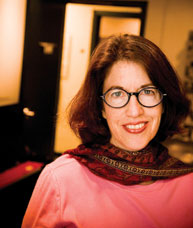Susan Rogers: The grad student formerly known as...
Susan Rogers: The grad student formerly known as... McGill University
User Tools (skip):
Profile
Susan Rogers: The grad student formerly known as...
Ever wade through a throng on the McGill campus and wonder where people have been instead of where they're headed? The person passing you on the stairs might have once spent great chunks of quality time with, say, Prince. "Our days were 24 hours long," recalled PhD student Susan Rogers of her time in the entourage of the Minstrel of Minneapolis. "You slept a few hours and started a new one."

During the recording of Barenaked Ladies Are Me, Susan Rogers, the album's producer, cooked the boys of the band a pancake breakfast.
Claudio Calligaris
Rogers, a behavioral neuroscience doctoral candidate now working on auditory memory, grew up in Southern California, where she dropped out of high school and became a sound engineer. "I loved music, but I wasn't a musician," she recalled. "I just always wanted to make records. I heard if you became an audio maintenance engineer, you'd always have a job."
A determined autodidact, Rogers scoured the shelves of Los Angeles' Opamp technical bookstore and sent away for the US Army's behemoth manuals on electronics.
At 22, she landed a gig repairing and installing recording equipment in Los Angeles and through her work met many of the musical greats of the era. After three years, Crosby, Stills and Nash poached her to work for their Rudy Records studio. In 1983, Rogers heard that her "favourite artist in the whole world, Prince, was looking for a technician from LA." She was mad for R 'n B, an expert after five years in the field, confident and knew that Prince liked working with women. After a call to Prince's management, she was Minnesota bound.
The musician had just come off the 1999 tour and was recording Purple Rain. His studio was in total disarray so Rogers repaired his tape machine, installed a new console and spent a few days getting everything running. When she told him it was ready, he said, well, set up a vocal mike. She did so and waited for the recording engineer to come in. After all, technicians just install the equipment; they don't actually run it and interact with the artist. No one showed. "So I finally asked who was going to record it. And he just looked at me like I was nuts and said 'You.' I said okay, and it was at that moment I realized he didn't know the difference between a recording engineer and a maintenance engineer."
She helped him finish some overdubs for Darling Nikki, and so began five intensely work-packed years with Prince. At first, Rogers struggled to achieve the sound Prince wanted. She could take the equipment apart and put it together, but remains grateful to Jesse Johnson, a member Prince's protégé band, The Time, who showed her how to use the kit to Prince's exacting requirements. "He liked working with people who were quiet and who had a lot of endurance."
After Prince's Paisley Park Studio was built, Rogers' "tour of duty" was up. She went independent and her characteristic sound and style led to a stint with the Jacksons. As Rogers worked with Edie Brickell, Public Image Ltd, Laurie Anderson and David Byrne, she got more into producing and mixing. The Barenaked Ladies pursued her and she took a few weeks in January 1998 to work on their album Stunt. It was a multi-platinum hit. Finally Rogers was earning royalties, which allowed her to pursue her second career goal. "I always wanted to go to school and become a scientist."
Rogers got her high school diploma at age 44 and entered a BSc at the University of Minnesota the same year. Now in her third year at McGill in the Levitin Laboratory for Music, Perception, Cognition and Expertise, Rogers probes whether the human mind is specialized for music, how musical training shapes your auditory memory and cognitive abilities. Because it's impossible to find true musical naives — "even if you hate it, you can't escape it" — she's considering turning to gerbils, "great little participants," who have a range of hearing close to that of humans.
Rogers took a brief break last fall to collaborate with Barenaked Ladies once more on their just-released Barenaked Ladies Are Me. After a day in the studio, working on the song Down to Earth, she lay in bed with the tune going through her head. She thought, "Wow, the past six hours I've been hearing this great song and I was right next to the guy [Ed Robertson] who was singing it. It kind of summarized what my career had been. I told them that the next day, and said, 'I really thank you guys, it's so much fun.' And later Steven Page said, 'You know, I had a similar moment. I was singing and playing and I looked at you and realized, 'I'm singing in front of the woman who recorded Kiss!'"

